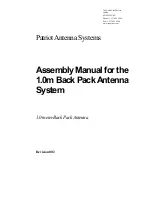
PRO-67-B V.2.S
REVIEW OF DRIVEN ELEMENTS
NOTE: There are several adjustments to the antenna.
The Back Driven Element, color-coded RED, controls 12, 17 and 40. (The only pre-drilled adjustment on this element is
the 40 meter end tips. However depending upon the installation the 12 and 17 meters can be adjusted. Contact our
engineering department if you have a problem with the center frequency on these bands.)
The Front Driven Element, color-coded BROWN, controls 10, 15, 20. You are provided with three choices for 10, 15 and
20 on the inner 7/8" tubing. 1. Code I = cw, 2. Code II phone & cw, 3. Code III Phone.
The Front Driven Element, color-coded BROWN. This element also has an adjustment to the 5/8" end tip when using the
CODE III setting on the inner 7/8" tubing.
The Yellow Reflector 5/8" End Tip has two settings: 1) 9-1/2" exposed 5/8" for CODE I, II: 2) 9" exposed 5/8" when
using the CODE III setting.
The Blue Director Inner 7/8" tubing has two settings 1) CODE I and 2) CODE II & CODE III. The Blue Director End Tip
has 3 settings for use on 40 Meters.
40 Meters:
The first adjustment that can be made to the 40 meter radiator, is the end tip. (The RED 3/8" end tip for the
BACK DRIVEN ELEMENT.)
There are 3 settings provided at 47", 49" and 57". (The director has corresponding settings to match the Radiator.
These pre-drilled settings will be good at the test height of 45' to 65'. (The CODE II setting should fall between 7,070
and 7,270, depending on the height above ground both real and artificial. Also pay attention to what of a resonate nature
is above or below the antenna. Since the "Q" of this antenna is very high and it is working on "6" bands it needs some
room away from other objects to operate.)
Before installing the antenna at its final location, you can determine if the setting you have chosen is adequate for your
installation and operating habits by following the test procedure to follow in the text.
When adjusting the antenna near to the ground, plan for a 70 to 125 kHz movement higher in frequency due to coupling
with ground. Both real and artificial!
When assembling the Back Red Radiator start by putting the 40 meter radiator end tip in the 47" position and the director
end tip in the 37" Code II setting. This will give you a good starting point to adjust from IF necessary.
Locate the center frequency at your installation. If the frequency is lower than you wish, you will need to shorten the end
tip. If it is higher in frequency, you will need to lengthen the end tips. In our testing we have found that the pre-set
setting will give you very good performance.
REFER TO DRAWINGS FOR PRE-SET dimensions for CODE I, II and CODE III for 40 meters.
10, 15, 20 Meters:
The second set of adjustments affects 10, 15, and 20 meters.
1) The Yellow Reflector 5/8" end tip;
2) The Blue inner Director 1-1/8" tubing;
3) The Brown front driven element 7/8" inner tubing. This piece has three
pre-drilled settings, CODE I, CODE II, CODE III.
4) The Brown front driven element end tip controls 20 meters and has 2 choices.
When selecting the Code settings, use the same Code dimensions throughout the entire antenna. DO NOT mix settings.
The pre-drilled CODE II setting covers from 14,315 to 14091 at or below 1:5 to 1. This has been the most requested
area of the band in which to configure the 20 meter section.
This element doesn’t need to be as high above ground to verify as the 40 meter end tip since it does not couple with
ground as readily. The CODE II setting on this element is centered at 14,187.
7





































